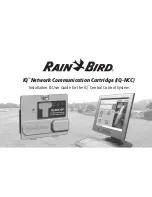
8 |
Baker Hughes
© 2020 Baker Hughes Company. All rights reserved.
IV. Warranty Information
Warranty Statement
- Baker Hughes warrants that its
products and work will meet all applicable specifications
and other specific product and work requirements and
will be free from defects in material and workmanship.
Refer to Baker Hughes’s Standard Terms of Sale, or
specific contract for complete details on warranty and
limitation of remedy and liability.
Defective and nonconforming items must be held for Baker
Hughes’s inspection and returned to the original F.O.B. point
upon request.
Incorrect Selection or Misapplication of Products
- Baker Hughes cannot be responsible for customer ’s
incorrect selection or misapplication of our products.
Unauthorized Repair Work
- Baker Hughes has not
authorized any non-Baker Hughes affiliated repair
companies, contractors or individuals to perform
modifications or services on new products or field repaired
products of its manufacture. Therefore, customers
contracting for such services or performing such services
on their own do so at their own risk.
Unauthorized Removal of Seals
- All new valves and
valves repaired in the field by Baker Hughes’s affiliated
repair companies are sealed to assure the customer
of our guarantee against defective workmanship.
Unauthorized removal and/or breakage of this seal will
negate our warranty.
•
Back Pressure
Back pressure is the static pressure existing at the
outlet of a safety valve device due to pressure in the
discharge system.
•
Blowdown
Blowdown is the difference between actual popping
pressure of a safety valve and actual reseating
pressure expressed as a percentage of set pressure,
or in pressure units.
•
Bore Area
Bore area is the minimum cross-sectional area of the
seat bushing.
•
Bore Diameter
Bore diameter is the minimum diameter of the seat
bushing.
•
Built-Up Back Pressure
Pressure existing at the outlet of a safety valve while
it is open and flowing through a discharge system.
•
Chatter
Chatter is abnormal, rapid reciprocating motion of the
moveable parts of a safety valve, in which the disc
contacts the seat.
•
Closing Pressure
Closing pressure is the value of decreasing inlet
static pressure at which the valve disc re-establishes
contact with the seat, or at which lift becomes zero.
•
Disc
A disc is the pressure containing moveable member
of a safety valve which effects closure.
•
Inlet Size
Inlet size is the nominal pipe size of the inlet of a
safety valve, unless otherwise designated.
•
Leak Test Pressure
Leak test pressure is the specified inlet static
pressure at which a quantitative seat leakage test is
performed in accordance with a standard procedure.
•
Lift
Lift is the actual travel of the disc away from closed
position when a valve is relieving.
•
Lifting Device
A lifting device is a device for manually opening a
safety valve, by the application of external force
to lessen the spring loading which holds the valve
closed.
V. Valve Terminology
(Paraphrased from ASME’s PTC 25)









































